2017 PMLA winners, shortlist and judges
The winners, shortlistees and judges of the 2017 Prime Minister's Literary Awards.
Judges 2017
Nonfiction and Australian history panel
Professor Lynette Russell AM (Chair)
Helen Trinca
Emeritus Professor Richard Waterhouse FRSN FAHA FASSA
Professor Greg Melleuish
Dr Sally Warhaft
Fiction and poetry panel
Professor Bronwyn Lea (Chair)
Dr James Ley
Susan Wyndham
Associate Professor Sarah Holland-Batt
Kathy Shand (2017 & 2018)
Children’s and young adult literature panel
Professor Margot Hillel OAM (Chair)
Joy Lawn
Margrete Lamond (2017 & 2019)
Professor Robyn Ewing AM
Sue Whiting
Kerry Neary (2018)
Non-fiction
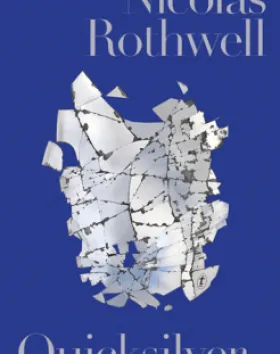
WINNER: Quicksilver – Nicolas Rothwell
Quicksilver
WINNER
Shortlist year: 2017
Shortlist category: Non-fiction
Published by: Text Publishing
Quicksilver begins in contemplation of a lizard deep in the heart of the outback but quickly moves to the Russia of Tolstoy and Gorky, and on to other lands and times, bringing into play universal questions about the essential nature of the human condition.
Rothwell’s chief subject is always the inland: the mystic Kurangara cult that flourished in the Kimberley; the story of the Western Desert artists; and the landscape word-portraits by the great biographer of nature Eric Rolls.
Quicksilver masterfully takes us in search of the sacred through place and time, in an enchanting reverie of calm wondering.
About the author
Nicolas Rothwell
Nicolas Rothwell is the award-winning author of Belomor, Heaven & Earth, Wings of the Kite-Hawk, Another Country, The Red Highway and Journeys to the Interior. He is a senior writer for the Australian.
Judges’ comments
This is an ambitious book, both in form and content, but one the judges believe has the power to change Australians’ understanding of their land and history.
Nicolas Rothwell uses a form – the essay – which is not always easy to carry off but which here amplifies his efforts to describe the nuances of our national history and culture.
Rothwell has created a work of art and an act of reconciliation through his stories of landscape, memory and meaning. His work is elegant and complex and he skillfully links ideas, events and people across the hemispheres, making surprising and rich connections between the ancient lands of Australia and Europe and beyond.
Rothwell’s rendering of landscape and place is deeply sensual and evocative. He encourages us to think outside the usual metropolitan focus. He demands our attention be given to an Australian landscape both familiar and alien and one with which he deeply connects.
Rothwell is a practiced and erudite observer and Quicksilver is a book that showcases his breadth of reading and reflection on issues of place and identity.
The judges described this book as contemporary in its outlook - a book of our time – but one, which will endure.
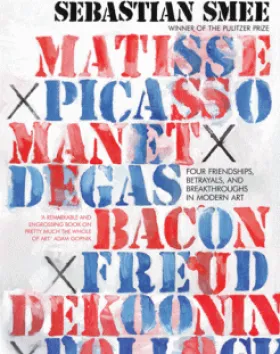
The Art of Rivalry: Four Friendships, Betrayals, and Breakthroughs in Modern Art – Sebastian Smee
The Art of Rivalry: Four Friendships, Betrayals, and Breakthroughs in Modern Art
Shortlist year: 2017
Shortlist category: Non-fiction
Published by: Text Publishing
Genius, friend, rival: this is the story of four pairs of artists whose intense relationships spurred and shaped their art.
Matisse and Picasso. Manet and Degas. Bacon and Freud. De Kooning and Pollock. Eight of the most significant modern artists; four pairs linked by friendship and a shared spirit of competitiveness.
Absorbing, informed and provocative, Sebastian Smee’s The Art of Rivalry offers revelatory insights into the ways in which these major artists influenced and changed each other—and into their ultimate quest ‘to be unique, original, inimitable; to acquire the solitude, the singularity, of greatness’.
About the author
Sebastian Smee
Sebastian Smee is the Boston Globe’s art critic. He was a Pulitzer Prize finalist in 2009 and a winner in 2011. His writing about art has appeared in many of the leading papers in Australia, the UK and the US. He grew up in Adelaide.
Judges’ comments
The Art of Rivalry: Four Friendships, Betrayals, and Breakthroughs in Modern Art by Mr Sebastian Smee
The Australian Pulitzer Prize-winning author Sebastian Smee has written a subtle and complex exploration of the affection and competition experienced by four sets of friends - all of them male artists.
Smee looks at how these friendships affected the work of the eight men - Édouard Manet and Edgar Degas; Henri Matisse and Pablo Picasso; Willem de Kooning and Jackson Pollock; Francis Bacon and Lucian Freud. Smee’s decision to examine the lives of some of the West’s most important artists through the prism of their friendships is original and adds to our understanding of their work. In the process, Smee offers intelligent and universal observations on the deep connections between love, friendship, competition and envy.
This is a very well-written book, which showcases Smee’s expertise and knowledge as an internationally acclaimed art critic. But the text is accessible, informative, entertaining and interesting. It’s a book based on a smart idea, which has been beautifully executed by a confident and mature writer.
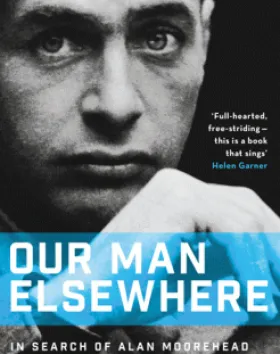
Our Man Elsewhere: In Search of Alan Moorehead – Thornton McCamish
Our Man Elsewhere: In Search of Alan Moorehead
Shortlist year: 2017
Shortlist category: Non-fiction
Published by: Black Inc
A world-famous Australian writer, an inspiration to Robert Hughes and Clive James, a legendary war correspondent who also wrote bestselling histories of exploration and conservation . . . and yet forgotten? In this dazzling book, Thornton McCamish delves into the past to reclaim a remarkable figure, Alan Moorehead.
As a reporter, Moorehead witnessed many of the great historical events of the mid-20th century: the Spanish Civil War and both world wars, Cold War espionage, and decolonisation in Africa. He debated strategy with Churchill and Gandhi, fished with Hemingway, and drank with Graham Greene, Ava Gardner and Truman Capote.
About the author
Thornton McCamish
Thornton McCamish is a freelance journalist and writer. He was editor of the Big Issue (Australia) magazine from 1996 to 1999. His book Supercargo: A Journey Among Ports (2002) was published by Lonely Planet. Thornton received a 2013 Merlyn Myer Biography stipend to write Our Man Elsewhere - awarded on the strength of his outstanding proposal.
Judges’ comments
This is a highly readable biography of a significant Australian writer whose work was widely read in the 1950s and 1960s but who today is less well known in his home country.
Thornton McCamish gives us a generous, but not uncritical, portrait of Alan Moorehead – one of our earliest 20th century expats- and brings his journalism and non-fiction books back into the frame for a new generation of readers. But McCamish does much more: this is a book about the biographer’s journey of discovery of his subject. In the process, McCamish gives us a clever and well-observed picture of a mid-20th century world in which the push and pull between Australia and Europe defined our culture. Moorehead was essentially a “middlebrow” writer and McCamish has done a brilliant job of placing his work in the wider context of Australian history.
This is a book about a passion for writing, but it is also about culture, class and the challenges of the biographer.
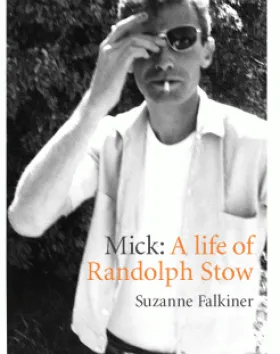
Mick: A Life of Randolph Stow – Dr Suzanne Falkiner
Mick: A Life of Randolph Stow
Shortlist year: 2017
Shortlist category: Non-fiction
Published by: University of Western Australia Publishing
Randolph Stow was one of the greatest Australian writers of his generation. His seven remarkable novels and several collections of poetry helped to change the way Australians viewed their land and their literature.
In Mick: A Life of Randolph Stow, Falkiner unravels the reasons behind Stow’s eventual quiet retreat from the literary world. Meticulously researched, insightful and at times deeply moving, Falkiner’s biography pieces together an intriguing life from Stow’s letters, diaries, and interviews with his closest friends. Stow’s own story provides us with keys to unlock the meaning of his rich and introspective works.
About the author
Dr Suzanne Falkiner
Suzanne Falkiner was born in Sydney and grew up in western New South Wales. After graduating from the University of New South Wales she spent several years travelling in Asia, Europe and South America, and has lived in Paris, Umbria, and New York, where she completed postgraduate courses at Columbia University.
Following various jobs in book and magazine publishing in Sydney, from the mid 1980s she has combined being a full time writer with editing, book reviewing, travel and other journalism. In 2005 she was awarded a Doctorate of Creative Arts at the University of Technology, Sydney.
Judges’ comments
This is a comprehensive biography of an important Australian writer, Randolph Stow, known to friends and family as Mick.
Suzanne Falkiner has undertaken extensive research and uncovered new material about an enigmatic novelist and poet who spent his final years as a recluse far from his country of birth. The text ranges from his childhood in wartime rural Western Australia to his formative years studying in Perth through to his years as a wandering ex-pat, and eventually as resident of the port town of Harwich Essex.
Stow’s brilliance was combined with personal battles against depression and mental illness and Falkiner handles this material with respect while never avoiding the truth of the writer’s life. In many ways this is a conventional biography but Falkiner’s curiosity and interest in the social and cultural context in which Stow worked, make it a compelling read.
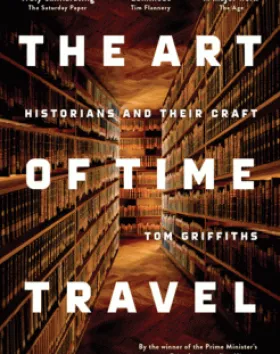
The Art of Time Travel: Historians and their Craft – Tom Griffiths
The Art of Time Travel: Historians and their Craft
Shortlist year: 2017
Shortlist category: Non-fiction
Published by: Black Inc
No matter how practised we are at history, it always humbles us. No matter how often we visit the past, it always surprises us. The art of time travel is to maintain critical poise and grace in this dizzy space.
Through portraits of fourteen historians, including Inga Clendinnen, Judith Wright, Geoffrey Blainey and Henry Reynolds, he traces how a body of work is formed out of a life-long dialogue between past evidence and present experience. With meticulous research and glowing prose, he shows how our understanding of the past has evolved, and what this changing history reveals about us.
About the author
Tom Griffiths
Tom Griffiths is the W K Hancock Professor of History at the Australian National University and the author of Slicing the Silence: Voyaging to Antarctica (2007), Forests of Ash: An Environmental History(2001) and Hunters and Collectors: The Antiquarian Imagination in Australia (1996). His books and essays have won prizes in literature, history, science, politics and journalism, including the Prime Minister’s Prize for Australian History in 2008, the Alfred Deakin Prize for an Essay Advancing Public Debate, and the Douglas Stewart and Nettie Palmer Prizes for Non-Fiction.
Judges’ comments
This is an impressive book that creatively explores the discipline of history as a craft that has made a considerable mark on Australia’s cultural identity.
In Tom Griffith’s vivid and accessible narrative history, the history and writing are shown to be both profound and idiosyncratic. Across fourteen chapters, each of which focuses on a significant writer, the reader is taken on a journey through Australian history. This is a book about the ideas that have shaped the writing of our history; its ambition is to expand our definition of Australian history and how we understand the stories of our past.
Griffith is a fine writer, at ease with his material and his concepts, who here demonstrates a capacity to combine historical data with analysis, biography and social commentary.
Poetry
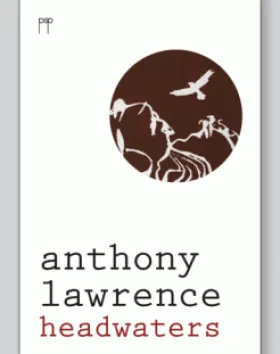
WINNER: Headwaters – Anthony Lawrence
Headwaters
WINNER
Shortlist year: 2017
Shortlist category: Poetry
Published by: Pitt Street Poetry
Winner
'Headwaters marries an extraordinary gift for observation of the natural world and an exquisite appreciation of human creatureliness with marvellous linguistic precision to create a singular, life-affirming music.' John Burnside
About the author
Anthony Lawrence
Anthony Lawrence, born 1957, in Tamworth, New South Wales, has published fifteen books of poetry and his work has won many of Australia’s most prestigious awards. He teaches Writing Poetry at Griffith University, Gold Coast, and lives on the far north coast of New South Wales.
Judges’ comments
Anthony Lawrence’s Headwaters meditates on complex ideas of sources and origins, from poems that delve into the estuarine world and the movement of bodies of water, to questions of family inheritances and the sometimes fraught relationships between sons and fathers, and encounters with poetic forebears such as Yeats and Dickinson.
Underlying all of these origins, however, is the body itself, the ultimate source: one which houses all experience, or, what the Scottish poet John Burnside, when praising this book, termed our “creatureliness”.
Some of the most powerful poems in the collection handle the body’s failings – deaths, the loss of a father’s ashes, and the rituals that follow funerary rights, to bodily harms experienced while slicing a foot open with the razor-sharp spines of a sea urchin, or detaching the retina of an eye with an errant piece of fencing wire, as well as threats to the body from pathogens and illness, addictions of various kinds, vices, and temptations.
Lawrence is a forensic observer of the animal and human worlds and a profound translator of that lived experience into the “unfenced shires” of language. Headwaters is a commanding addition to Lawrence’s oeuvre.

Painting Red Orchids – Eileen Chong
Painting Red Orchids
Shortlist year: 2017
Shortlist category: Poetry
Published by: Pitt Street Poetry
Eileen Chong’s new collection continues her exploration of the contemplative and the personal within subtly shifting contexts of food, love, history and culture. Lovers of her poetry will find much that is familiar and much that is new. Over the three volumes of work represented on this page the reader can map a transition from a precocious apprenticeship to a mature voice, through moments of light and happiness mixed with hints of grief and foreboding.
As always her technical confidence and linguistic sophistication allow her to offer poems which appear simple on the surface, transparent enough to appreciate at a first reading and yet which contain depths and resonances which repay repeated attention and thought. Through this combination of beauty and depth, Eileen Chong commands a wide and devoted following.
About the author
Eileen Chong
Eileen Chong is Sydney poet who was was born in Singapore. She moved to Australia in 2007 and took a Master of Letters at the University of Sydney. She won the Poets Union Youth Fellowship in 2010 and was the Australian Poetry Fellow for 2011-2012.
Her first collection, Burning Rice, was published in 2012. It was shortlisted for the Anne Elder Award 2012, the Australian Arts in Asia Award 2013, and the Prime Minister’s Literary Award 2013. Her second collection, Peony, was published by Pitt Street Poetry in 2014. Painting Red Orchids (2016) is her third volume of poetry. A selection of poems, Another Language is published in the Braziller Series of Australian poets by George Braziller, New York.
Judges’ comments
Eileen Chong’s Painting Red Orchids reveals an introspective poet whose acute command of form and painterly sensibility deftly capture both the quotidian and intimate worlds and larger questions of cultural belonging, history and home. Travelling between the balconies of Sydney, Singapore Harbour and Hong Kong ferries, Chong’s poems delight in sensory and tactile detail, which the poet renders with precision and restraint, whether she is describing chefs making fresh dumplings behind a sheet of glass “dressed like surgeons”, or the notes of a zither that “shiver in the night air”.
Underlying the sensual pleasures of food, alcohol and sex, however, are deeper griefs: here, a mother’s miscarriage, funerals, intergenerational loss and change jostle for attention alongside the pleasures of the flesh. The poet also occasionally turns her eye to history’s silences and omissions to great effect, examining a black and white photograph of a Chinese miner during the gold rush, and the twin drumbeats of war and adolescence in the mind of Hua Mu Lan as she advances across a battlefield while posing as a man.
Overall, what impresses most about Chong’s poems is their music, imagery, formal control and sense of craft; this is a poet with a keen eye and ear who finds deep meaning in fleeting moments.
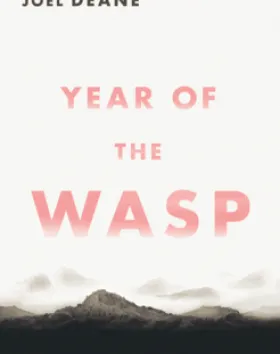
Year of the Wasp – Joel Deane
Year of the Wasp
Shortlist year: 2017
Shortlist category: Poetry
Published by: Year of the Wasp
In 2012 poet and writer Joel Deane suffered a stroke. Suddenly he was a poet without language. The music and imagery of poetry, for so long the impetus of all his writing, would not come. Year of the Wasp charts Deane’s journey to rediscover his poetic voice.
From these deeply personal origins Deane’s third poetry collection rises to confront the realities of politics and culture, language and love in contemporary Australia. It is a journey of poetic transfiguration that produces a work of unrivalled power, emotional intensity, and insight.
About the author
Joel Deane
Joel Deane is the author of seven books, including The Norseman’s Song, Catch and Kill: the politics of power, and Magisterium, and has written speeches for Labor politicians such as Bill Shorten, Steve Bracks, and John Brumby. He has been a finalist for the Walkley Award and the Melbourne Prize for Literature, and been shortlisted for the Anne Elder Award.
Judges’ comments
Joel Deane’s Year of the Wasp was written after the poet, speechwriter and novelist suffered a stroke in 2012.
There is a visceral sense of the poet reengaging with the world through language and imagery that starts with his experience in hospital where his immediate physical surroundings become the locus for several of his poems: “the air-conditioning was far too cold” and “his life repeats on the portable TV power-drilled to the hospital ceiling”.
In the second section, “Eight Views of Nowhere”, the poems move outwards from the hospital bed to address injustice and inhumanity on a larger scale, employing Greek mythology with metaphorical intensity and a tightness of phrasing. The poet brings an otherworldliness into this dark world using words that echo liturgical prayer: “and so I pray to the digital celestials / to program me this day / my daily bread.”
There is no self pity here; rather Deane uses the occasion of his stroke to reflect on life more broadly with moral, political, literary and biblical allusions.
The wasp motif is used repeatedly as both an internal buzzing in the author’s head, a distortion of the reality around the poet, and ultimately a marker of transcendence. This is a poignant and powerful collection that confronts the reader with the impermanence and beauty of life and the restorative power of poetry.
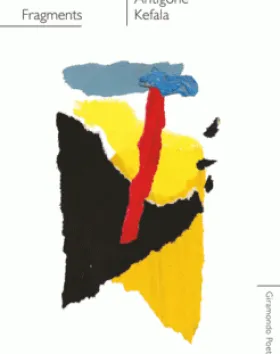
Fragments – Antigone Kefala
Fragments
Shortlist year: 2017
Shortlist category: Poetry
Published by: Giramondo Publishing
Antigone Kefala is highly regarded for the intensity of her vision, and her minimalism. Fragments is her first collection of poems in almost twenty years, since the publication of New and Selected Poems in 1998. It follows her 2008 memoir Sydney Journals, of which one critic wrote, ‘Kefala can render the music of the moment so perfectly, she leaves one almost singing with the pleasure of it’. This skill in capturing the moment is just as evident in Fragments, with its linguistic precision, its heightened perception and sense of drama.
About the author
Antigone Kefala
Antigone Kefala has written four works of fiction, including The First Journey, The Island and Summer Visit, and four poetry collections, The Alien, Thirsty Weather, European Notebook and Absence: New and Selected Poems as well as the non-fiction work Sydney Journals. Born in Romania of Greek parents, she lived in Greece and New Zealand before coming to Australia.
Judges’ comments
Antigone Kefala’s Fragments is a searing enactment of memory. Time demolishes us all in little doses, so the poet contends, but the past is “a poison / we thirst for”. Shards of memory conjure the world in various states of evanescence: dreams evoke empty rooms in old houses, the floorboards gone, even the walls are thinning to mist – here and there the cry of birds pierce the enveloping silence.
We, like the poems, may “sink in light, disappear in silence”, but Kefala bids us to recall the “glossy beings” of our younger selves who head into the future innocent to what awaits us.
Kefala astounds with imagery that is intense, unsettling and always unexpected: at dusk in the coastal town of Derveni on the Peloponnese peninsula, fishing boats are “massive dark stones / planted / in a field of moonstone”. Light, fire and flowers are recurring motifs, as is the theme of “self-sufficiency”, which in the fierce austerity of Kefala’s mind finds its ultimate embodiment in death.
Fragments is a wonder of minimalism in which we find ourselves, like the poet, dancing in memory rooms growing bigger and bigger. It is a major work by a senior poet whose poetry continues to fascinate.
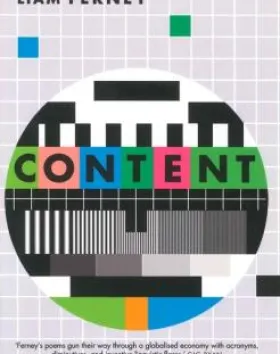
Content – Liam Ferney
Content
Shortlist year: 2017
Shortlist category: Poetry
Published by: Hunter Publishers
In his latest collection, Liam Ferney focuses on the deep contradictions at the heart of modern life. This is fast-paced poetry that is explosive, critical, and engaged.
Ferney uses the argot of politics and the internet to tackle religion, war, love, and late capitalism. Content is a hand grenade tossed into the middle of polite society. He charts and parodies a hypertextual world, engrossed in media while passionately critical of their effects.
About the author
Liam Ferney
Liam Ferney is the author of Popular Mechanics (2004) and Boom (2013), which was shortlisted for the Kenneth Slessor Poetry Prize and the Judith Wright Calanthe Award. His work has been published internationally and translated into Korean and Mandarin. He lives in Brisbane.
Judges’ comments
Liam Ferney’s Content puts the Age of Information in the cross hairs.
“Frumpy bloggers” serve up homilies and hot takes, while “the newspapers in this town / only report reliably / on gossip, slander & opinion”. Knowledge has up and fled and citizens – or “users” – are content with mere content. “We have made knowledge redundant,” Ferney writes in the poem “Summer Anthem”, just “in time for cigarettes & g&ts / at the pool”.
Like frogs that fail to leap from the boiling pot, we are anesthetised to our addiction to the vapid content of rolling entertainment that passes for news: “when the networks go down we all look / up from our smart phones,” he writes with wry accusation, “and ask – / what next?”
While many poets are satisfied to “play with soundbites while transnational market forces play with us”, Ferney proves himself to be the rightful heir to the great John Forbes by holding a mirror to machines of power that doubles as an indictment.
This is an exhilarating, frequently hilarious, language-driven poetry that shows us precisely where we’re at. It may not be the news we want to hear, but Ferney’s poems bring the news we deserve and undoubtedly need.
Fiction

WINNER: Border Districts – Gerald Murnane
Border Districts
WINNER
Shortlist year: 2018
Shortlist category: Fiction
Published by: Giramondo Publishing
Conceived as Gerald Murnane's last work of fiction, Border Districts was written after the author moved from Melbourne to a small town on the western edge of the Wimmera Plains, near the border with South Australia. The narrator of this fiction has made a similar move, from a capital city to a remote town in the border country, where he intends to spend the last years of his life. It is a time for exploring the enduring elements of his experience, as these exist in his mind, not as an integral landscape now, but as image-fragments.
About the author
Gerald Murnane
Gerald Murnane was born in Melbourne in 1939. He is the author of 11 works of fiction, including Tamarisk Row, The Plains, Inland, Barley Patch, A History of Books, A Million Windows, and Border Districts, and a collection of essays, Invisible Yet Enduring Lilacs. He is a recipient of an Emeritus Fellowship from the Australia Council, the Patrick White Literary Award, the Melbourne Prize for Literature, the Adelaide Festival Literature Award for Innovation and the Victorian Premier's Literary Award.
Judges’ comments
In Border Districts, Gerald Murnane has distilled the various elements of his inimitable literary sensibility into a perfectly formed short work. The logic of this unique book is associative rather than narrative. Styled as a 'report' on the images that strike the mind of its narrator, it has him relating scenes from his childhood and adolescence, reflecting on the books he has read, remembering old acquaintances, and taking in the landscape of the small borderland town where he has come to live. The narrative is an exquisite prism of introspection, in which a life's experiences are carefully ordered and transformed into art by virtue of the patterns they come to form in the mind and the profoundly evocative qualities they have acquired. Rendered in crystalline prose and touched with an elegiac pathos, Border Districts is the crowning achievement of a singular literary career.

First Person – Richard Flanagan
First Person
Shortlist year: 2018
Shortlist category: Fiction
Published by: Penguin Random House
A young and penniless writer, Kif Kehlmann, is rung in the middle of the night by the notorious criminal, Siegfried Heidl. About to go to trial for defrauding the banks of $700 million, Heidl proposes a deal: $10,000 for Kehlmann to ghost write his memoir in six weeks. As he writes, Kehlmann begins to fear that he is being corrupted, he becomes ever more unsure if he is ghost writing a memoir, or if Heidl is rewriting him. Everything that was certain grows uncertain as he begins to wonder: who is Siegfried Heidl—and who is Kif Kehlmann?
About the author
Richard Flanagan
Richard Flanagan was born in Tasmania in 1961. His novels Death of a River Guide, The Sound of One Hand Clapping, Gould's Book of Fish, The Unknown Terrorist, Wanting and The Narrow Road to the Deep North have received numerous honours and are published in 42 countries. He won the Man Booker Prize for The Narrow Road to the Deep North in 2014.
Judges’ comments
First Person by Richard Flanagan is a powerful and comic examination of the life of a writer. Flanagan takes us inside the mind of the writer as he tries to understand his craft, his subject and the world in which he writes. The author's alter ego, Kif Kehlmann, is commissioned to ghost write the memoir of a con man and the intersection of his life with that of his subject provides the momentum for an exploration of morality, capitalism and contemporary times. The loss of moral certitude in the face of financial reward looms large. Flanagan takes it all on in this compellingly biting satire.

Taboo – Kim Scott
Taboo
Shortlist year: 2018
Shortlist category: Fiction
Published by: Pan Macmillan
Taboo tells the story of a group of Noongar people who revisit, for the first time in many decades, a taboo place: the site of a massacre that followed the assassination, by these Noongar's descendants, of a white man who had stolen a black woman. They come at the invitation of Dan Horton, the elderly owner of the farm on which the massacres unfolded. He hopes that by hosting the group he will satisfy his wife's dying wishes and cleanse some moral stain from the ground on which he and his family have lived for generations.
About the author
Kim Scott
Kim Scott is a multi-award winning novelist. Benang was the first novel by an Indigenous writer to win the Miles Franklin Award and in 2011 That Deadman Dance also won the Miles Franklin Award, among many other honours. Proud to be one among those who call themselves Noongar, Scott is founder and chair of the Wirlomin Noongar Language and Story Project, which has published a number of bilingual picture books. He received an Australian Centenary Medal and was 2012 West Australian of the Year. He is currently Professor of Writing in the School of Media, Culture and Creative Arts at Curtin University.
Judges’ comments
In his ambitious third novel, Taboo, Kim Scott attempts a fictional act of reconciliation on West Australian land scarred by a historic massacre of Indigenous people. Members of the Noongar community return to honour the ghosts of their dead ancestors and to meet land owners who may still wish them ill. At the centre of the story Tilly, a teen-age girl, seeks to understand her complicated heritage. Scott writes with urgency about his people's need to reclaim their land, history and language while recognising their place in contemporary Australia. The novel is a skillful blend of fable and thriller, Dreamtime magic and Canterbury Tales road trip. Goodwill and brutality wrestle for dominance among a band of vivid and sometimes comic individuals who represent the complexity of human nature. Taboo is a haunting, original and important contribution to Australian literature.

The Life To Come – Michelle de Kretser
The Life To Come
Shortlist year: 2018
Shortlist category: Fiction
Published by: Allen & Unwin
Set in Sydney, Paris and Sri Lanka, The Life to Come is a mesmerising novel about the stories we tell and don't tell ourselves as individuals, as societies and as nations. Pippa is a writer who longs for success. Celeste tries to convince herself that her feelings for her married lover are reciprocated. Ash makes strategic use of his childhood in Sri Lanka but blots out the memory of a tragedy from that time. Driven by riveting stories and unforgettable characters, here is a dazzling meditation on intimacy, loneliness and our flawed perception of other people.
About the author
Michelle de Kretser
Michelle de Kretser was born in Sri Lanka and emigrated to Australia when she was 14. Educated in Melbourne and Paris, Michelle has worked as a university tutor, an editor and book reviewer. She is the author of The Rose Grower, The Hamilton Case, and The Lost Dog, which won a number of awards, including the 2008 ALS Gold Medal and longlisted for the Man Booker Prize. Her last novel, Questions of Travel, received 14 honours, including winning the 2013 Miles Franklin Literary Award and the Prime Minister's Literary Award for fiction.
Judges’ comments
The Life to Come by Michelle de Kretser is a sophisticated and cosmopolitan novel about lives displaced by trauma and travel. Five sections set in Sydney, Paris and Sri Lanka follow an ensemble of characters loosely connected by the striving Australian writer, Pippa Reynolds. The intricate narrative observes contemporary urban life at both macro and micro levels, from the politics of colonialism and immigration to the faux pas of tourists and the smell of a doomed spice shop in Sydney's inner-west. De Kretser is a perfectionist in her crafting of precise sentences, exquisite imagery and subtly shifting perspectives. Her laser-beam satire sees through pretension and ignorance, while paying respect to the lost and lonely. The Life to Come portrays Australia's multi-faceted identity with tremendous wit and insight.
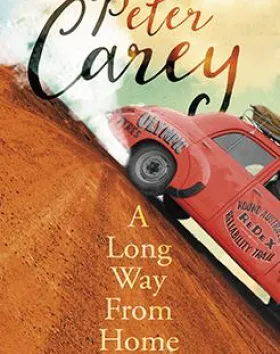
A Long Way From Home – Peter Carey
A Long Way From Home
Shortlist year: 2018
Shortlist category: Fiction
Published by: Penguin Random House
Irene Bobs loves fast driving. Her husband is the best car salesman in western Victoria. Together they enter the Redex Trial, a brutal race around the ancient continent over roads no car will ever quite survive. This thrilling, high-speed story is often funny and always a page-turner, even as you learn a history these characters never knew themselves. Set in the 1950s amid the consequences of the age of empires, this brilliantly vivid and lively novel reminds us how Europeans took possession of a timeless culture—the high purpose they invented and the crimes they committed along the way.
About the author
Peter Carey
Peter Carey was born in Bacchus Marsh, Victoria, and now lives in New York. He is the author of fourteen novels (including one for children), two volumes of short stories, and two books on travel. Amongst other prizes, Carey has won the Man Booker Prize twice (for Oscar and Lucinda and True History of the Kelly Gang), the Commonwealth Writers' Prize twice (for Jack Maggs and True History of the Kelly Gang), and the Miles Franklin Literary Award three times (for Bliss, Oscar and Lucinda and Jack Maggs).
Judges’ comments
Peter Carey's A Long Way From Home heralds the novelist's return to the fertile stomping grounds of Bacchus Marsh, his childhood home and frequent literary touchstone. Carey's rollicking, technicolour imagination is at full throttle in his descriptions of the Redex Trial: a bone-rattling and perilous trip around Australia that brings his three companions into contact with the vast continent in a way they have never experienced before. But the resulting journey becomes something far larger, stranger and more powerful than a car race across Australia's plains: it morphs into an interrogation of what home is, what it can mean, and how history can rarely be settled by maps or narratives found in books. A Long Way From Home shows Carey in high form, balancing the antic and the deadly serious on a knife's edge, and marks a powerful contribution to his oeuvre.
Young adult literature
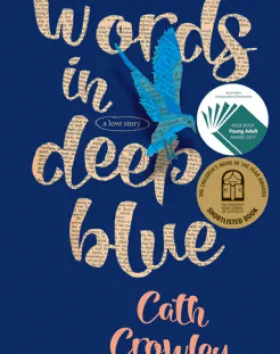
WINNER: Words in Deep Blue – Cath Crowley
Words in Deep Blue
WINNER
Shortlist year: 2017
Shortlist category: Young adult literature
Published by: Pan Macmillan Australia
Second-hand bookshops are full of mysteries
This is a love story.
It's the story of Howling Books, where readers write letters to strangers, to lovers, to poets, to words.
It's the story of Henry Jones and Rachel Sweetie. They were best friends once, before Rachel moved to the sea.
Now, she's back, working at the bookstore, grieving for her brother Cal. She's looking for the future in the books people love, and the words that they leave behind.
Sometimes you need the poets
About the author
Cath Crowley
Cath Crowley is a young adult author published in Australia and internationally. She is the author of The Gracie Faltrain trilogy, Chasing Charlie Duskin, and Graffiti Moon. In 2011, Graffiti Moon won the Prime Minister's Literary Award for Young Adult Fiction, the Ethel Turner Award for Young People's Literature, and was named an Honour Book in the Children's Book Council, Book of the Year. Cath lives in Ballarat, Victoria.
Judges’ comments
In her deeply layered, eloquent exploration of different kinds of love, Cath Crowley celebrates story, the importance of family, the meaning of friendship and the power of words. The story is set in and around Howling Books, an extraordinary second-hand bookshop in Melbourne where readers can scribble margin notes or leave letters in their favourite books in the Letter Library, the heart of the bookshop.
The central characters Rachel Sweetie and Henry Jones are richly drawn through a dual narrative alongside the many letters that tell their complex stories and those of their friends and families. Henry can’t understand why Rachel ceased to be his best friend after she moved to live on the coast with her grandmother. Rachel, profoundly grieving for her brother Cal, can’t understand why Henry didn’t share ‘the last day’ with her after reading her letter. Rachel’s move back to the city marks the beginning of their journey back to friendship. Rachel starts to accept her brother’s death and finds herself again so she can move forward into the future. The imminent sale of the bookshop signals a real crisis of identity for Henry’s family and some of their longstanding friends but may actually emancipate them.
The book has many thoughtful design features that help to engage and extend the reader from the brief fragments of text that precede each chapter to the quotes from well-known novels and poems that remind us of the different meanings individuals bring to their reading of texts, to the explorations of complex concepts (the transmigration of memory, the block universe theory). Words in Deep Blue shows us how deeply words do matter.
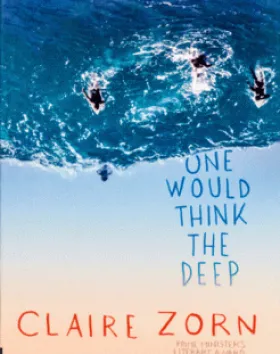
One Would Think the Deep – Claire Zorn
One Would Think the Deep
Shortlist year: 2017
Shortlist category: Young adult literature
Published by: University of Queensland Press
From the multi award-winning author of The Protected and The Sky So Heavy comes a ground-breaking young adult masterpiece about lost young men.
After his mum dies Sam goes to live with the strangers she cut ties with seven years ago: Aunty Lorraine and his cousins Shane and Minty.
Sam is soon surfing with Minty to cut through the static fuzz in his head. But as the days slowly meld into one another, and ghosts from the past reappear, Sam has to make the ultimate decision … will he sink or will he swim.
About the author
Claire Zorn
Claire Zorn lives on the south coast of New South Wales with her husband and two small children. Her first young adult novel, The Sky So Heavy, was a CBCA Honour Book for Older Readers and was shortlisted for the Aurealis and Inky Awards. Her second book, The Protected, was the winner of the 2015 Prime Minister’s Literary Awards for Young Adult Fiction, Victorian Premier’s Literary Awards – Young Adult Fiction and CBCA Book of the Year for Older Readers. One Would Think the Deep is her third book for young adults.
Judges’ comments
Claire Zorn has created a sensory allegory of grief and rage in One Would Think the Deep. Set in a quintessential beachside community in 1997, Zorn traces Sam’s relocation from the city as he reels, baffled and angry, from the death of his mother. He finds some solace in surfing. His encounters with the waves and the unseen Leviathan monster of the deep become a metaphor for sparring with depression and destruction. His growing mastery of surfing signals a possible outcome of hope and healing. Sam begins a tentative relationship with athletic Gretchen. Another pivotal character is Ruby who challenges the misogyny of surfing culture and whose Aboriginal heritage forms a counterpoint to Sam’s hidden family background. However, the authentic male characters are the heart of the novel, with popular cousin Minty and honourable Jono a foil to smouldering Sam.
Jeff Buckley’s music and “the space between the notes” in his song Grace provide a soundtrack to the era and template for the writing shape and style. The allusive title and epigraph about rousing the Leviathan who “leaves a glistening wake; one would think the deep had white hair”, comes from the Biblical book of Job, a picture of the suffering that now ensnares Sam. This powerful novel embodies the layered depths of masculine grief and struggle to maturity.

Forgetting Foster – Dianne Touchell
Forgetting Foster
Shortlist year: 2017
Shortlist category: Young adult literature
Published by: Allen & Unwin
Forgetting Foster, is the powerful story of a young boy whose father develops Alzheimer's disease, from the highly acclaimed author of A Small Madness.
Foster Sumner is seven years old. He likes toy soldiers, tadpole hunting, going to school and the beach. Best of all, he likes listening to his dad's stories.
But then Foster's dad starts forgetting things. No one is too worried at first. Foster and Dad giggle about it. But the forgetting gets worse. And suddenly no one is laughing anymore.
A heartbreaking story about what it means to forget and to be forgotten.
About the author
Dianne Touchell
Dianne Touchell was born and raised in Fremantle, Western Australia. Her debut novel Creepy & Maud (Fremantle Press) was Shortlisted for the Children's Book Council of Australia's Book of the Year Award in 2013 in the Older Readers category. Her second novel, A Small Madness, was published by Allen & Unwin in 2015.
She has worked as a fry cook, a nightclub singer, a housekeeper, a bookseller and manager of a construction company. Sometimes she has time to write books for young adults, who she thinks are far more interesting than grown-ups. She lives with animals.
Judges’ comments
In a refreshing departure from the self-conscious and sometimes cynically introspective world-view of many young adult book characters, this novel plots the progress of an intensely adult situation from the point-of-view of a child. Seen through the eyes of seven-year-old Foster, the narrative is a naïve, clear-eyed and often brutally candid observation of the cruelty of Alzheimer’s. Foster’s father has always been a lively, charismatic storyteller, but then holes begin to appear in his memory and his behaviour starts to become erratic. Foster valiantly refuses to acknowledge the gravity of the changes in his dad, but is all too conscious of the changes in his mother’s attitude: overworked, over-tired and overwrought, she has little emotional energy left for Foster. Duplicitous family members and neighbours contribute to the emotional wreckage.
This novel is an elegant and agonising portrait of the breakdown and realignment of family configurations, the pressures on friendships, and the spectrum of emotional damage experienced by both child and adult characters. Foster wades through extremes of puzzlement, betrayal, loyalty, mortification, estrangement, rage, guilt, compassion and love. He must navigate the behaviour of the flawed adults in his life, the unthinking childhood cruelty of his classmates, and finds himself battling between filial loyalty and social self-preservation, while clinging hopefully to his father’s brief moments of lucidity. But, in an enigmatic ending, and without fanfare, Foster silently and with gentle finality comes to terms with the inevitable.

The Bone Sparrow – Zana Fraillon
The Bone Sparrow
Shortlist year: 2017
Shortlist category: Young adult literature
Published by: Hachette Australia
Subhi is a refugee. Born in an Australian permanent detention centre after his mother fled the violence of a distant homeland, life behind the fences is all he has ever known. But as he grows, his imagination gets bigger too, until it is bursting at the limits of his world. The Night Sea brings him gifts, the faraway whales sing to him, and the birds tell their stories.
The Bone Sparrow is a powerful, heartbreaking, sometimes funny and ultimately uplifting hymn to freedom and love.
About the author
Zana Fraillon
Zana Fraillon was born in Melbourne, but spent her early childhood in San Francisco. Zana has written two picture books for young children, a series for middle readers, and a novel for older readers based on research and accounts of survivors of the Forgotten Generation. She spent a year in China teaching English. The Bone Sparrow won the 2017 ABIA Book of the Year for Older Children.
Judges’ comments
Told poignantly and authentically through the naïve lens of the irrepressible nine-year-old Subhi, this powerful story is timely and important.
Subhi has known only one life - behind the razor wires in a detention centre. His world is confined, brutal and with many hardships. He longs to meet his poet father, wishes his mother would have enough energy to tell him her stories of Burma again, dreams of a beautiful Night Sea that brings him treasures, and talks to the wise-cracking Shakespeare duck. With his rebellious friend Eli, Subhi runs “packages” around the camp, a dangerous pursuit.
Jimmie, a young girl who lives near the centre, provides a second narrative voice, with a number of clever parallels to Subhi’s story. Jimmie has her own struggles: she is grieving for her mother and yearns to be able to read. When Jimmie discovers a way into the centre, an unlikely friendship results. Jimmie brings Subhi thermoses of hot chocolate and Subhi reads out Jimmie’s mother’s stories. But tensions are rising in the centre and soon violence erupts and tragedy strikes.
Set against the harshness and brutality of life in the detention centre, The Bone Sparrow celebrates human courage, spirit and imagination; the power of story, especially in our understanding of self; the importance of friendship; and our right to freedom. It is a beautifully written story, deeply layered and with rich imagery and evocative use of language. The motif of the Night Sea is particularly moving and the humour of Subhi’s Shakespeare duck provides some welcome relief to his dire circumstances.
Honest, deeply affecting and thought provoking, The Bone Sparrow is a story that stays with you long after the last page.
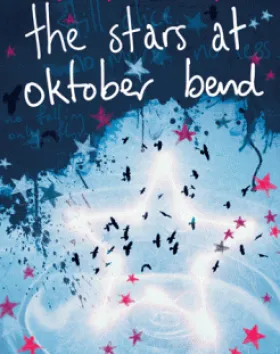
The Stars at Oktober Bend – Glenda Millard
The Stars at Oktober Bend
Shortlist year: 2017
Shortlist category: Young adult literature
Published by: Allen & Unwin
A powerful, captivating story about Alice, who is reaching out to express herself through her beautiful-broken words, and Manny who is running to escape his past. When they meet, they find the tender beginnings of love and healing.
About the author
Glenda Millard
Glenda Millard is a highly respected author who writes for children of all ages. Her novel A Small Free Kiss in the Dark was the Winner of the 2009 Queensland Premier's Award for young adults, Honour Book in the 2010 CBCA awards for older readers, shortlisted for the 2010 NSW Premier's Literary Awards, and included on the Honour List for the 2012 International Board of Books for Young People. Glenda has also written many picture books, including The Duck and the Darklings, illustrated by Stephen Michael King, which was Winner of the 2016 WA Premier's Literary Awards for children's books.
Judges’ comments
Alice has been the victim of a traumatic attack by some young men who live in her small town of Oktober Bend. The trauma has left her unable to communicate easily with others and she mostly stays at home. She is, however, a gifted poet and it is largely through these that she communicates with the outside world. Much of what we learn about her as a character comes from her thoughts and poetry.
Into her life comes Manny, a former boy soldier who has also been the victim of trauma. His gentleness and protectiveness, despite all he has suffered, is in stark contrast with the local boys who attacked Alice. He is intrigued by the mysterious, anonymous poet who leaves poems tucked in odd places around the town (such as behind the timetable at the bus stop) and he follows this poetic trail to discover that it is Alice who is writing them. In a sense, the two are the ‘outsiders’ in the town and the friendship they form becomes a turning point for each of them.
The book is written with a dual narrative so we hear alternately from Manny and Alice. Each of these voices is authentic and convincing. Alice’s sections are seamlessly interwoven with her poems and the device adds a richness and complexity to the narrative. There is a cast of peripheral characters who drift in and out of the story and each of them is strongly drawn and convincing. The climactic scene of a flood in the town is dramatic and convincingly realised and allows for the construction of a scene of moving forgiveness when Alice, despite her fear, helps the ringleader of the gang which attacked her. This is a cleverly constructed book with great depth and which is both poignant and profound.
Children's literature
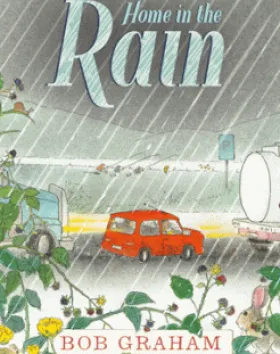
WINNER: Home in the Rain – Bob Graham
Home in the Rain
WINNER
Shortlist year: 2017
Shortlist category: Children's literature
Published by: Walker Books
Francie's going to have a new baby sister very soon. But what will her name be? Francie has so many ideas! On a long drive home with Mum, in the pouring rain, maybe they'll find one that's just right... From multi-award winning author-illustrator Bob Graham comes a tender, touching story of family life, perfect for sharing when a new baby is on the way. A beautifully observed celebration of the way inspiration can, and often does happen in the most ordinary and unlikely of places.
About the author
Bob Graham
Bob Graham is a Kate Greenaway-winning author-illustrator who has written and illustrated many acclaimed children's picture books including How to Heal a Broken Wing, How the Sun Got to Coco's House, Max, Jethro Byrde: Fairy Child and April Underhill: Tooth Fairy. His 2011 title, A Bus Called Heaven, is endorsed by Amnesty International UK and was the winner of the 2012 Children's Book Council of Australia Picture Book of the Year Award - a prize Bob has won an unprecedented six times. In 2014, Silver Buttons was awarded a prestigious Prime Minister's Literary Award in Australia.
Bob lives in Melbourne.
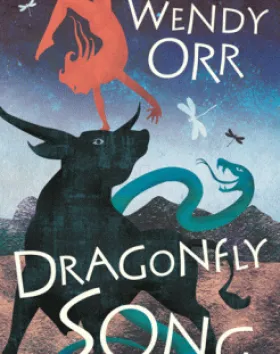
WINNER: Dragonfly Song – Wendy Orr
Dragonfly Song
WINNER
Shortlist year: 2017
Shortlist category: Children's literature
Published by: Allen & Unwin
Winner
Abandoned by the priestess of the island at birth, Aissa is an outcast, surviving by her wits - until she joins the acrobatic bull dancers who are sent away to compete on the island of the Bull King. A gripping and powerful adventure by acclaimed author Wendy Orr.
About the author
Wendy Orr
Wendy Orr was born in Edmonton, Canada, but grew up in various places across Canada, France and the USA. She started writing for children after a career as an occupational therapist. She's the author of many award-winning books, including Nim's Island, Nim at Sea, Raven's Mountain and Peeling the Onion.
Judges’ comments
In a breathtaking blend of stunning verse and poetic prose, this tragic tale of loss and abandonment, courage and resilience tells the story of Aissa the firstborn child of the Lady. Born with a minor imperfection, Aissa is shunned by the Lady, but spared by Keyla, the wise-woman, and given to a family far away. Tragedy stalks Aissa though and four years later raiders kill her adopted family, and she is an outcast once more. Enslaved, mute, considered cursed and shown to be worthless, she is given the name of No-Name. But when Aissa turns thirteen, she seizes upon the unexpected opportunity to become the island’s female tribute to the Bull King. No tribute has ever returned to the island, but for Aissa this dangerous “honour” represents her only means of escape.
Set in Bronze Age Crete, impeccably researched and inspired by the legend of the Minotaur, the ancient culture depicted is richly imagined and realised. Aissa is a wonderfully complex character, whose struggles take the reader on an epic journey, exploring themes of acceptance and rejection, perfectionism, difference and worthiness, identity and resilience.
Dragonfly Song is more than an ancient myth re-visioned. Its songlike narrative is poignant and wise, brave and ambitious. Quite simply, it is storytelling at its very best.

My Brother – Dee Huxley, Illustrator: Oliver Huxley
My Brother
Shortlist year: 2017
Shortlist category: Children's literature
Published by: Working Title Press - an imprint of HarperCollinsChildren’sBooks
When a gentle creature sets out to search for a lost brother we are taken on an ethereal journey across land and sea to strange, beautiful and faraway places. To fantastic, floating cities, and mediaeval towns full of dark alleyways and winding staircases – to vast open grasslands and eerie, silent forests – and eventually to a place of timeless beauty and light. My Brother is a metaphorical picture book story for older children that looks at loss and grief from a sibling’s perspective.
About the author
Dee Huxley
Dee Huxley studied design and craft at the National Art School, East Sydney. After graduating she taught visual arts in secondary schools in Australia and London. Between 1984 and 2012 she taught Design and Illustration at TAFE Enmore Design Centre, and Life Drawing at NIDA.
A freelance illustrator since 1976, her works include the short-listed CBCA Picture Books of the Year, Mr Nick’s Knitting, Rain Dance and You and Me Our Place, and the 2009 CBCA Honour Book, Tom Tom, written by Rosemary Sullivan. My Brother is the fourth picture book Dee has both written and illustrated.
About the illustrator
Oliver Huxley
I started drawing before I could tie my shoelaces.
I have always loved sketching animals, and drawing strange imaginary creatures - mythical monsters and fantastic beasts - in my sketchbooks.
After closely watching my mother’s successful career as a picture book illustrator and the beautiful books she has done, I spent several years studying both Graphic Design and 3D animation, with the goal of becoming a children’s book illustrator, like her.
During this time I created character for a story I wanted to write about a gentle but strong creature living in an apocalyptic world. My brother Morgan loved this character and kept a tiny canvas of tit on the mantelpiece in his apartment. The creature was never designed to be Morgan, but after his death in tragic and destructive circumstances, this character became the focal point of the story my mother and I decided to dedicate to him.
It was an honour and also a moment of peace to collaborate on this book together with my mother and my sister Tiffany who was the designer.
The book was important for us all. We did not know where Morgan had gone or why. We wanted to try and create a place for him. We wanted to make sense of what was happening around us when there was no sense.
Working on the book gave us gave us a reason to smile, which was hard to do at times. It also gave us hope –and the belief that our story might help a child to find some hope during an equally dark despairing time – when the words, even of loved ones, cannot help.
I am currently working on a book about a chihuahua in Japan, while working nightshifts in a large Swedish company famous for its furniture.
I live in Sydney with my strong willed and very supportive wife, Elizabeth, and my wonderful short haired black Chihuahua Kolo.
Judges’ comments
This is a moving story about overwhelming grief and loss. Longing for his lost brother, a distressed and lonely creature searches for him. He searches high and low, visiting all their old haunts, both joyful and scary. When his search is unsuccessful the creature is exhausted and lies down to sleep for a while. On waking he senses a new understanding and acceptance of his loss. The use of soft watercolour in the final pages replaces the earlier monochromatic images to reflect the realisation that his brother is not lost. Rather he is everywhere and in every memory.
Beautifully designed, My Brother uses careful placement of well chosen, minimal text, almost stream of consciousness and plenty of white space to create the profound sense of pain and loss. Each detailed image engages us in the search and each can be explored at length and re-visited many times. A tiny donkey gently leads us forward to the next page, leading us to the bitter-sweet realisation and relief that we can learn to live through loss and grief and begin to think about the future. While grief is an intense and personal journey, this book will resonate with older children and adults who have lost someone dear.
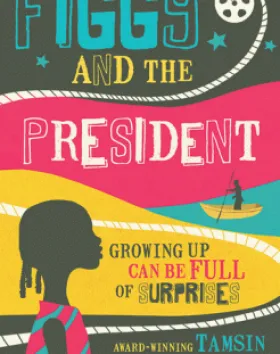
Figgy and the President – Tamsin Janu
Figgy and the President
Shortlist year: 2017
Shortlist category: Children's literature
Published by: Scholastic Australia
Funny, original story from a young, award-winning author. The sequel to NSW Premier's Literary Award winner Figgy in the World. Figgy gets a role in a movie, and her friend Nana wants to be the President. But Figgy's mama is sick and expecting a baby, and Nana's father takes him away. Suddenly, Figgy's life changes course. This is an inspiring story about resourcefulness, courage and helping others.
About the author
Tamsin Janu
Tamsin Janu lives in Sydney. Her debut novel Figgy in the World, and its sequels Figgy and the President and Figgy Takes the City, were born from memories of her three month trip to Ghana, West Africa in 2009. Many of the locations she visited and kids she met are depicted in her novels. Her standalone junior novel Blossom, set in Australia, was released in 2017.
Tamsin won the Children's Literature Award and Premier's Award at the 2016 Adelaide Festival Awards for Literature, and was joint winner of the Patricia Wrightson Prize at the 2015 NSW Premier's Literary Awards.
Judges’ comments
Figgy is an endearing, warm-hearted girl who lives with her grandmother and other children in a village in Ghana. Tamsin Janu introduced Figgy, and her stoic attitude towards her damaged eye, to young Australians in her debut novel, Figgy in the World. Figgy and the President can be read independently as an original and exciting narrative. This tale highlights and develops Figgy’s joyous voice, thoughts and ingenuous yet independent character. Her best friend, exuberant Nana, aspires to becoming the President of Ghana. Even though only ten years old, Figgy feels pressure to plan her own career but her path diversifies when she is given the opportunity to act in a movie, playing the role of a girl from a background like her own. Although materially poor, the characters in this community are rich in friendship, respect and love.
The children face disturbing situations and weighty issues when Figgy’s dysfunctional mother returns and Nana is stolen and sold by his father. Figgy’s strong agency to effect change, despite her childhood innocence, is shown deftly and with authority. In clear, fresh prose the author creates an authentic picture of her characters, their interaction and the colour and spirit of Ghana within an engaging, empowering and sometimes humorous storyline.
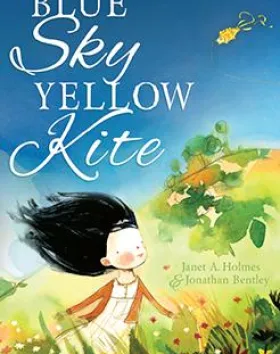
Blue Sky, Yellow Kite – Janet A. Holmes, Illustrator: Jonathan Bentley
Blue Sky, Yellow Kite
Shortlist year: 2017
Shortlist category: Children's literature
Published by: Little Hare Books
Sometimes we want a thing so much we can't prevent ourselves from taking it. But when a girl steals her friend's beautiful yellow kite, she is swamped with turmoil. A story about desire, guilt and forgiveness.
About the author
Janet A. Holmes
Janet was born and grew up in Perth, Western Australia. She has worked as a teacher librarian, an education officer in the Parliament of Australia, a researcher/writer and finally a secretariat manager in the Senate and House of Representatives committee systems. Duck, Janet's first book with Little Hare, has just been published as a Little Hare Classic.
About the illustrator
Jonathan Bentley
Jonathan has been an editorial illustrator at the Courier Mail newspaper for ten years, and has illustrated books for Margaret Wild, The Wiggles and Andrew Daddo. He has illustrated several books for Little Hare including Holmes' debut Duck.
Judges’ comments
This beautifully produced picture book is a celebration of friendship as well as reminding us all of the importance of saying sorry if one has done something to hurt another person. Daisy is a small girl who sees a wonderful yellow kite, shaped like a fish, soaring high in the blue sky. She follows it to where William is flying it from his front garden. He shares the joy of flying it with her but her reaction is unexpected as she runs away with the kite and hides it in her bedroom. This does not give her the pleasure she expects, however, as she cannot share the kite, is consumed with guilt and wonders how to make it right. Eventually she writes sorry on the path outside William’s gate and, in a delightful moment of reconciliation, William demonstrates his forgiveness by making Daisy a kite of her own.
The spare and carefully constructed written text is wonderfully complemented by the illustrations which are full of colour and movement. Daisy's black cat appears in most of the illustrations providing a link between them as well as a counterpoint to Daisy’s emotions—it is the cat who sits disapprovingly outside her bedroom door when she hides the kite on her wardrobe, and he joins in the joyful play as the two children fly their kites together. It is significant that no adult appears in the story; Daisy has to find her own way of dealing with her actions and William devises his own way of demonstrating forgiveness. There are intriguing spaces in both the illustrations and the written text which allow the reader to be an active participant in constructing the narrative. This is a story with a strong moral without being in any way moralistic.
Australian history
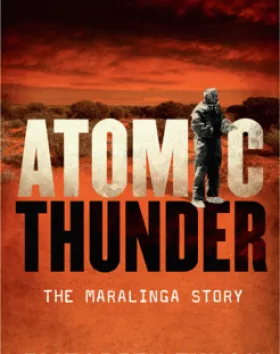
WINNER: Atomic Thunder – Dr Elizabeth Tynan
Atomic Thunder
WINNER
Shortlist year: 2017
Shortlist category: Australian history
Published by: NewSouth Publishing
September 2016 marked 60 years since the first British atomic tests were conducted at Maralinga in South Australia, decimating an Indigenous community and irreversibly contaminating the land and its people.
In 1956, Australia provided 3200 square kilometres of desert to the British Government, along with logistics and personnel. Australian prime minister Robert Menzies blithely agreed to the tests and relinquished control over them. This book reveals the devastating consequences of that decision.
Here, Elizabeth Tynan reveals how Australia allowed itself to be duped, and contributes to the fight for justice for nuclear veterans, Indigenous landowners and the contaminated land itself.
About the author
Dr Elizabeth Tynan
Elizabeth Tynan is a science writer and academic at the James Cook University (JCU) Graduate Research School in Queensland, Australia. A former journalist, she completed a PhD on aspects of British nuclear testing in Australia, and is co-author of the book Media and Journalism: New approaches to theory and practice, now in its third edition.
Judges’ comments
This book reveals new details about one of the most important stories in recent Australian history - the atomic tests by the British government in the South Australian desert at Maralinga in the 1950s. This well-executed work offers compelling and at times shocking information about an exercise that has been mired in secrecy and controversy for decades.
Elizabeth Tynan has produced a readable account, which mixes excellent knowledge of science and social and political history. The research is detailed and balanced and the narrative is well paced. Tynan is a clear writer and her tone remains confident yet curious throughout. The book shows an astute understanding of the Cold War context in which the tests took place yet does not avoid the betrayal of Australians by their political leaders nor the shameful treatment of the health and safety of Aboriginal Australians in particular.
Atomic Thunder is a book that speaks to Australian audiences and raises issues of government responsibility and transparency that continue to resonate today. It is an impressive work of history - a book that is long overdue and one that is likely to remain the definitive account of that period.
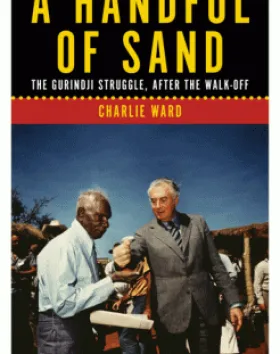
A Handful of Sand: The Gurindji Struggle, After the Walk-off – Charlie Ward
A Handful of Sand: The Gurindji Struggle, After the Walk-off
Shortlist year: 2017
Shortlist category: Australian history
Published by: Monash University Publishing
Fifty years ago, a group of striking Aboriginal stockmen in remote Northern Territory heralded a revolution in the cattle industry and a massive shift in Aboriginal affairs. This book tells the story behind the Gurindji people’s famous Wave Hill Walk-off in 1966 and questions the meanings commonly attributed to the return of their land by Gough Whitlam in 1975. Written with a sensitive, candid and perceptive hand, A Handful of Sand reveals the path Vincent Lingiari and other Gurindji elders took to achieve their land rights victory, and how their struggles in fact began, rather than ended, with Whitlam’s handback.
About the author
Charlie Ward
Charlie Ward is a writer and historian, based in Darwin. He worked in the Gurindji communities of Kalkaringi and Daguragu between 2004 and 2006 and then as a researcher with the Stolen Generations' Link-up program in Alice Springs. Now an oral history interviewer with the National Library of Australia, Charlie’s work has appeared in journals including Griffith Review, Meanjin and Southerly. A Handful of Sand is his first book.
Judges’ comments
More than 50 years ago, in very top of the Northern Territory, two-hundred Gurindji, Mudburra, and Warlpiri workers walked-off the remote Wave Hill cattle station and declared themselves to be on strike. Led by the now legendary Aboriginal leader Vincent Lingiari these men set in motion a new future, which led to better pay, more control and ultimately land rights.
A Handful of Sand is a significant book by a young researcher who has worked in and studied indigenous communities for many years. The story has been covered at length in the press, however this book provides a perspective missing from much daily journalism.
Charlie Ward deals with the complexities of the Wave Hill walk-off and the return of the Gurindji land in a sophisticated manner. The narrative is honest and told with an appropriate reticence: Ward is an insider/outsider who never loses his professional judgement nor his respect for the protagonists in this inspiring but sometimes tragic story.
He is an historian who interrogates his material to dissect the complex issues of the state versus individuals and the internal tensions between generations of established leaders and younger Aborigines with different ambitions and capacities.
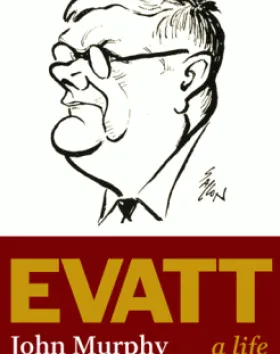
Evatt: A Life – Professor John Murphy
Evatt: A Life
Shortlist year: 2017
Shortlist category: Australian history
Published by: NewSouth Publishing
John Murphy’s Evatt: A Life is a biography of Australian parliamentarian and jurist HV Evatt. Remembered as the first foreign minister to argue for an independent Australian policy in the 1940s and for his central role in the formation of the UN, Evatt became leader of the Labor party in the 1950s, the time of the split that resulted in the party being out of power for a generation. Murphy places Evatt in the context of a long period of conservatism in Australia, treating his personal life as just as important as his controversial and eventual tragic public career.
About the author
Professor John Murphy
John Murphy is a professor of politics at the University of Melbourne. He is also Assistant Dean in the Faculty of Arts. He writes prolifically on Australian social and political history and is editor of the Australian politics and policy series in Melbourne University Publishing's Academic Monograph series. He is author of many books, including Harvest of Fear: A history of Australia's Vietnam War (Allen & Unwin, 1993); Imagining the fifties: Private sentiment and political culture in Menzies’ Australia (UNSW Press, 2000) and was a contributor to Half a Citizen: Life on Welfare in Australia (Allen & Unwin, 2011).
Judges’ comments
This is an excellent book, by an established and respected scholar. With polish and complete control of the material John Murphy has written a book that captures the extraordinary public and private life of Evatt.
Murphy’s portrait of Federal Labor leader Herbert Vere “Doc” Evatt is revealing and definitive. Murphy’s careful research has shown Evatt to be a combination of brilliance and dedication though occasionally foolish; given to grandiosity. Across a career that led him from jurist to the youngest High Court judge onto a NSW State and later Federal politician; and perhaps most importantly as Australia’s foreign minister involved in the establishment of the United Nations.
This book revises the orthodoxy of Evatt and provides valuable insights into Australia’s political and social history. The work is mature and objective, yet it is a very accessible book at the same time. Undoubtedly this will be the “go to” book on Evatt in future years.

Valiant for Truth: The Life of Chester Wilmot, War Correspondent – Neil McDonald
Valiant for Truth: The Life of Chester Wilmot, War Correspondent
Shortlist year: 2017
Shortlist category: Australian history
Published by: NewSouth Publishing
Chester Wilmot (1911–1954) was a renowned Australian war correspondent, broadcaster and writer. Covering the North African battles of Bardia, Tobruk and Derna, the disaster of the Greek Campaign, the epic struggle along the Kokoda Track, the invasion at Normandy and the defeat of Nazi Germany, his voice stood above all others during BBC and ABC broadcasts throughout World War II.
Following the war he continued reporting and published The Struggle for Europe, his classic account of the Normandy invasion, before he was tragically killed in 1954.
Valiant for Truth charts Wilmot’s exceptional life as he reported key events of the twentieth century.
About the author
Neil McDonald
Neil McDonald is a film historian and author. His books include Kokoda Front Line: the amazing story of legendary Australian war cameraman Damien Parer (Hachette 1994, 2004, revised edition 2012). He is co-author with Peter Brune of 200 Shots, a pictorial account of Australian fighting on the Kokoda Track.
Peter Brune is bestselling author of A Bastard of a Place: the Australians in Papua; Those Ragged Bloody Heroes: from the Kokoda Trail to Gona Beach 1942 and most recently Descent into Hell: The fall of Singapore – Pudu and Changi – the Thai Burma railway.
Judges’ comments
This book is to be commended for its well-researched and well-documented World War II accounts. Chester Wilmot was an Australian journalist and war correspondent. The authors of this sensitive biography illustrate that Wilmot was a reporter with integrity and a strong moral code. At times this led to Wilmot finding himself at odds with censors, who were known to redact large sections of his reports, for fear that his accuracy would aid the enemy.
Wilmot was an extensive traveller having gone to both Japan and Europe before World War II. In these contexts he noted and wrote of growing nationalism, racism, and what he regarded as developing fanaticism. In a prescient and informed manner Wilmot contextualised and historicised these feelings.
As a war correspondent Wilmot was witness to battles in Europe and Papua New Guinea.
As a broadcaster for both the BBC and ABC he became a trusted commentator by both the general audience and members of the military.
This comprehensive and finely researched book sheds new light on the career and experiences of one of Australia’s most renowned War correspondents. Of particular note is how the book deals with Wilmot’s early years, which provide good insight into his life at that time.
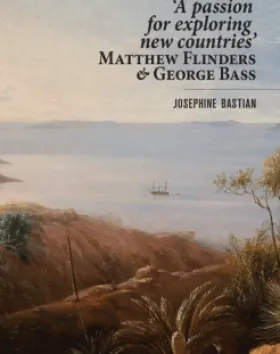
A passion for exploring new countries – Matthew Flinders and George Bass – Josephine Bastian
'A passion for exploring new countries' Matthew Flinders and George Bass
Shortlist year: 2017
Shortlist category: Australian history
Published by: Australian Scholarly Publishing
Matthew Flinders and George Bass, two obscure young men from Lincolnshire, arrived in Sydney in 1795 determined to achieve greatness. Flinders wanted to be an explorer ‘second only to Cook’, Bass a naturalist, another Sir Joseph Banks, and a rich Sydney trader. For eight years these two pursued their destiny. Their voyages changed the map of Australia, and Flinders gave it its name. But then it was all over. This book is historically rigorous, yet its protagonists’ fascinating and contrasting characters and the extraordinary events of their lives make it as gripping as any novel.
About the author
Josephine Bastian
Josephine Bastian is the daughter of a Danish goldminer and a school teacher of Irish descent. She spent her childhood in the bush and lived for several years on the goldfields near Mudgee, NSW, where her mother started a one-teacher school. She attended the University of Sydney on a government scholarship and subsequently took a higher degree at London University. She has travelled widely, and worked in several countries as teacher, author and editor; her writing includes articles, radio documentaries and history.
Judges’ comments
The passion of Bastian’s title operates as a theme throughout this important book. The narrative that emerges is a much more intimate story about the relationship of Flinders and Bass than has previously been told. Setting these men against the context of their families and those they left behind, importantly the author considers the effect of these tumultuous lives on others. With a strong sense of the value of archival research, the author’s fresh approach uses new material and brings the context of exploration and the Imperial need for mapping to light. The people and their relationships are seen as constrained and contained by the larger project.
Grounded in diaries and primary sources, the author gives a wonderful insight into this period in Australia’s history. The book is very readable and accessible and deserves to be read and appreciated by a large audience. It explains and reminds the reader of the incredible energy, dedication, and sacrifice of the explorers of this time as they attempted to map, understand and claim new lands.


